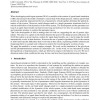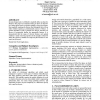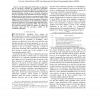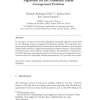534 search results - page 18 / 107 » Expert-driven genetic algorithms for simulating evaluation f... |
MABS
2005
Springer
14 years 2 months ago
2005
Springer
When developping multi-agent systems (MAS) or models in the context of agent-based simulation (ABS), the tuning of the model constitutes a crucial step of the design process. Inde...
GECCO
2007
Springer
14 years 2 months ago
2007
Springer
In many design tasks it is difficult to explicitly define an objective function. This paper uses machine learning to derive an objective in a feature space based on selected examp...
EUROGP
2001
Springer
14 years 29 days ago
2001
Springer
An evolutionary algorithm is used to design a finite impulse response digital filter with reduced power consumption. The proposed design approach combines genetic optimization an...
CEC
2008
IEEE
14 years 3 months ago
2008
IEEE
—The first hitting time (FHT) plays an important role in convergence evaluation for evolutionary algorithms. However, the current criteria of the FHT are mostly under a hypothesi...
COR
2008
13 years 8 months ago
2008
In this paper, an improved Two-Stage Simulated Annealing algorithm is presented for the Minimum Linear Arrangement Problem for Graphs. This algorithm integrates several distinguis...




